HIT CHANNEL EXCLUSIVE INTERVIEW: June 2024. We had the great honor to talk with a legendary musician and producer: Jeff “Skunk” Baxter. He is best known as the guitarist and founding member of Steely Dan and later a member of The Doobie Brothers, with whom he was inducted in the Rock and Roll Hall of Fame in 2020. He has also been a member of Spirit and the supergroup The Best and has played with Donna Summer, Elton John, Rod Stewart, Eric Clapton, Ringo Starr, Albert King, The Beach Boys, The Yardbirds, Barbra Streisand, Dolly Parton, James Brown, Al Kooper, Slash, Billy Gibbons, Brian May and many others. In addition, he produced albums for Bobby and the Midnites (band led by Grateful Dead’s guitarist Bob Weir), Nazareth, The Ventures and Nils Lofgren. In 2022 he released his first solo album “Speed of Heat”. Read below the very interesting things he told us:
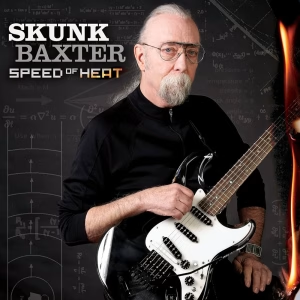 “Speed of Heat” is your first solo album and you are still touring for this. Are you satisfied with the response you got so far from fans and press for the album?
“Speed of Heat” is your first solo album and you are still touring for this. Are you satisfied with the response you got so far from fans and press for the album?
You know, you always wanna be humble, I ‘m just thrilled when anybody cares about what I do and the response to both the album and the tour has been really good, so we are gonna keep going.
“Ladies from Hell” has Scottish and Irish musical references on it. Is this a kind of tribute to your family roots?
Yes, in a lot of ways. It was something that I wanted to do for my dad and just there is something about the bagpipes that I love. So, we thought we can incorporate it and it was on.
You had Jonny Lang, Clint Black and Michael McDonald (The Doobie Brothers -vocals) on the album. Why did you choose those particular guests?
Mostly, because I thought that I wanted to do things that were different and obviously the Michael McDonald song (ed: “My Place In the Sun”) is something very different than he has ever done. Clint Black is an old friend and I wanted to give him the opportunity to try something different and the same with Jonny Lang.
Why did you decide to re-work the Steely Dan songs “Do It Again” and “My Old School” on your solo album “Speed of Heat”?
In terms of “My Old School”, I used to sing that live with Steely Dan and every time we would do it we ‘d get a little more emotion, a little more energetic and I thought: “Maybe this song could be a really energetic hard rockin’ song”. So, I wrote an arrangement for it and that’s why I did it and I think it came out a lot tougher than the original, that’s for sure. “Do It Again” is the first Steely Dan single and I ‘m not a cover band, I want to take songs that’s I had done before and re-work them. “Do It Again”, we just turned it upside-down and inside-out. It was a lot of fun.
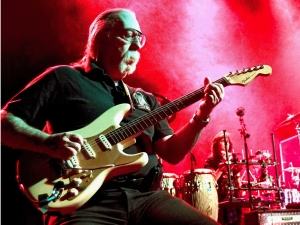 How emotional was it for you to record “The Rose” on your “Speed of Heat” album?
How emotional was it for you to record “The Rose” on your “Speed of Heat” album?
That is something that I did in memory of my father. Many-many years ago, I was on the Advisory Board for Guitar Player magazine. They held a 25th anniversary event in San Francisco and they had asked me to come up with something to play while they showed photographs of wonderful guitar players and colleagues who had passed on. I thought about it and I said: “‘The Rose’ is a beautiful song” and nobody had ever played pedal steel a cappella, just by itself. They said: “Ok” and I went on stage, I started the program and I started to play and I was halfway through the first verse, when Adrian Belew (ed: King Crimson, David Bowie, Frank Zappa -guitar) came out and plugged in and then by the end of the second verse I had a drummer, a bass player and a keyboard player and I thought: “Wow! This is a beautiful song”. So, whenever I got the opportunity, I would like to record it and I think the pedal steel has such a beautiful “voice”. I want to really showcase it and highlight it.
Why it took you so long for your first solo album?
I wanted it to do with a friend of mine, CJ Vanston (ed: songwriter, producer, keyboardist) and we were both pretty busy, so we ‘d just get together when we had some free time over about 12 years. I don’t know, it’s one of those things where if you save your coins in a jar, eventually the jar fills up. You have to roll them up and do something with these. We got to a point where there was enough recording that we had to do something with it and I just didn’t have much time. Also, I thought doing a solo album and after you leave very or much successful bands, I just didn’t think was a cool idea. Let it develop; develop yourself, see where you are going, see where things are and I wanted to just take my time.
Did you enjoy playing last June in London with Brian May and Ronnie Wood at a James Burton (Elvis Presley -guitar) and Friends show?
Very much. James Burton and I have been friends for probably longer than you are. How old are you?
38.
We ‘ve been friends longer than you are, since you ‘ve been born and I support James in whatever he does and I ‘ve known Brian for a long time and I’ve known Ronnie. So, it turned out to be a wonderful evening.
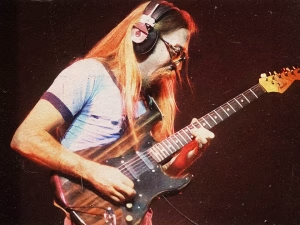 “Only A Fool Would Say That” from Steely Dan’s “Can’t Buy a Thrill” (1972) is a response to John Lennon’s “Imagine”. Do you remember the story behind this song?
“Only A Fool Would Say That” from Steely Dan’s “Can’t Buy a Thrill” (1972) is a response to John Lennon’s “Imagine”. Do you remember the story behind this song?
Yes, but I will say that: I ‘m very hesitant to comment on the meanings of Steely Dan songs because everybody has their own idea. But it was a fun song to do! Very different!
What was the musical vision that Steely Dan had on “Countdown to Ecstasy” (1973) album?
I think a lot of it was: We had already done one album and it was fairly successful and the question was: How we would capture the essence of what we thought the band was, now that we had a chance to develop? So, I think “Countdown to Ecstasy” was in a sense “Steely Dan defining Steely Dan”.
Your guitar solo in “Rikki Don’t Lose that Number (from “Pretzel Logic” – 1974) is amazing. Could you please tell us everything we should know about this great song?
Oh, thank you. I always find it difficult to talk about why I did what I did, but I do believe that any good guitar solo should be a composition in and of itself: A beginning, a middle and an end and then it fits into the song. So, I wanted it to be the opening very bluesy, so it would be easy for people who are listening to relate to it and then I thought once I had them comfortable and relating to it, then I would move out of the typical and start to look at how I would substitute melodies over the chord changes. They weren’t necessarily typically blues, more jazz-oriented and then finish it up with something that may people feel was good.
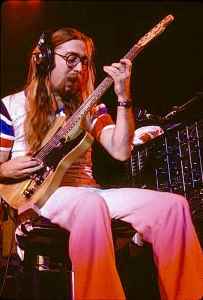 Steely Dan are considered one of the most intellectual bands of all time. Had you realized that at the time or it just came naturally to you?
Steely Dan are considered one of the most intellectual bands of all time. Had you realized that at the time or it just came naturally to you?
We were just kids and I mean, we were all seasoned studio musicians, at least I was, Jimmy (ed: Hodder -drums) was and I had done so many records with other people. I just looked at it as: “I ‘m gonna put my best foot forward”. As far as intellectual, we certainly understood that we weren’t writing your typical “Baby, I love you” lyrics and if we were, we were gonna word it in a very different way. But when you are inside it, it’s very difficult to be able to step outside and make judgments like that. I think the “Countdown to Ecstasy” (1973) album, as you said, was probably our first attempt to define who we were as a band.
I ‘ve read that Frank Zappa was a fan of Steely Dan and that Steely Dan were listening to a lot of his music. Do you know anything about this?
No, I met Frank a few times but I really didn’t know a whole lot about it.
A couple of months ago I did a very good interview with Randy Brecker (Brecker Brothers, Blood Sweat & Tears, Bruce Springsteen), the trumpet player and he told me that everybody who went into a Steely Dan session, knew that they would play 20 or 30 takes, so they saved the best lines for the end. Is it true?
Oh, great! He’s fantastic. Certainly there was an effort to try to get the best performance. I am not sure that I agree with the idea that 30 takes were necessary to get the best performance. The performance on “My Old School” (ed: from “Countdown to Ecstasy” -1973) was one take. When I did “Hot Stuff” for Donna Summer, that was one take. So, from my standpoint, I think the first performances are the best, because you are not overthinking it.
That’s what Ron Carter (Miles Davis Quintet -double bass) told me last year: “On the first take you play the music, on the second take you play yourself”.
And you tend to overthink it every time you play. Then it becomes an exercise as opposed to an emotional experience.
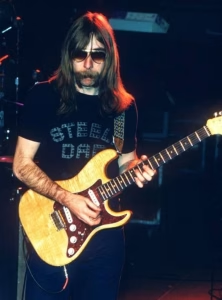 Why did Steely Dan have awful album covers? Was it a conscious decision or you just couldn’t find better artwork?
Why did Steely Dan have awful album covers? Was it a conscious decision or you just couldn’t find better artwork?
I didn’t really care. I felt that if somebody felt that it was very important for them to be in charge of the album cover, it’s fine with me. I got other things that I had to worry about.
What does your Rock and Roll Hall of Fame induction with The Doobie Brothers in 2020 mean to you?
Certainly, in a lot of ways it’s like winning a Grammy or it’s like getting any kind of attention and respect from your peers; it’s a wonderful thing. It gives you a sense of accomplishment and it also makes you feel like you ‘ve actually done something with your life. So, yeah, I take it as an honor, absolutely.
How did it happen to meet and play with Jimi Hendrix?
I was working in a music store, on 48th St. in New York, which is where all the music stores were located, across the street from Manny’s, that was the Jimmy’s Music Shop. A gentleman walked in named Jimmy James and he had a kind of beat-up Fender Duo-Sonic guitar and he wanted to get something nice and new. I also built, customized and repaired guitars, so I had prepared a right-handed Stratocaster for a left-handed player. I saw a very nice guy and I said: “Ok, I just trade you even”. Of course, I got two weeks’ pay deducted from my salary because obviously the guitar that I gave him was worth much more than the guitar I got. But we became friends and I went down to see him play one night and the bass player was late, so I ended up playing a couple of tunes. After that we had stayed in touch and we became, not really close friends, but I don’t know if you have friends that you don’t see for a while, but it doesn’t make any difference, because as soon as you see them again, the connection is there.
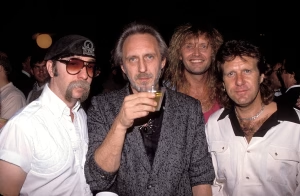
Did you enjoy being a member of The Best with Joe Walsh, Keith Emerson, John Entwistle and Simon Phillips?
Oh, yeah. What a band! Don’t get any better, that’s why we called it The Best. But it was an interesting concept. We all played songs that were written by the other friends. I wanted to do songs that John Entwistle (ed: The Who -bass) wrote and Keith wanted to do songs that I had done with Steely Dan and The Doobie Brothers. In other words, we played our favorites that we had for each other. A very interesting way to go by doing it and it was incredible! The level of musicianship was so high. When we were rehearsing, we were rehearsing John’s song, “Boris the Spider” (ed: from The Who’s “A Quick One” -1966) and just for the heck of it, I started to play the guitar line for “Josh”, the theme from the movie. Of course, nothing gets past Keith, so immediately he started to play the whole theme, so he said: “Ok. Well, that happens” and we go into “Night on Bald Mountain” by Mussorgsky, and of course Keith was very familiar with this Mussorgsky because of “Pictures at an Exhibition” (ed: Mussorgsky’s piano suite which was recorded live by Emerson Lake & Palmer in 1971), so the band immediately goes into playing “Night on Bald Mountain”. John said: “Ok. What the heck?!”, so he started to play the background melody line for Stravinsky’s “Rite of Spring” and again Keith jumped right into it and don’t forget that John Entwistle was classically trained on French horn. So, it wasn’t like we were going down a road that nobody was familiar with. So when we performed it in Japan, people looked at us like we were totally crazy. How do we get from “Boris the Spider” to “Josh” to “Night on Bald Mountain” to Stravinsky’s “Rite of Spring” and back to “Boris the Spider”? We just had so much fun because there were no limits. Nobody said: “You had to do this” or “you had to do that”.
Why The Best didn’t last longer?
I think it was one of those things where you just do it and that’s it! We were all very busy, we all had other projects to do and we just decided: “Ok”. We just checked that box. John and I, we were friends before that and we remained friends: Simon Phillips (Toto, The Who -drums), Joe Walsh (The Eagles, The James Gang -κιθάρα) and Keith, who sadly passed away. Sometimes things have their moments. You shouldn’t try to push it past that.
I recently learned, because I talked with Steve Hackett (Genesis -guitar) that Keith Emerson wanted to form a band with Jack Bruce (Cream -bass, vocals) and Steve Hackett, but Keith and Jack Bruce had an argument during the recordings. Do you know anything about that?
No, I ‘m not familiar with it. Sorry.
Did you have a good time playing at Steve Cropper’s 80th birthday party with Billy Gibbons, Eddie Floyd and Jason Scheff (Chicago – vocals)?
You bet. Again, Steve Cropper and I have been friends for many-many years, so not only did I enjoy playing the show, but I went downtown to meet the mayor of Nashville and said: “You need to declare today ‘Steve Cropper Day’ in Nashville, Tennessee” and he did and he came on stage with the proclamation. So, that day is “Steve Cropper Day” from now on. Steve is such an old friend, such a good friend. You stick with your friends, you stick with the people that you care about. As a matter of fact, I just played in Nashville the other day, so Steve came up to soundcheck (ed: he shows to his PC camera in our Zoom interview a photo of him with Steve Cropper that has on his cell phone), sat around and we got to catch up together.
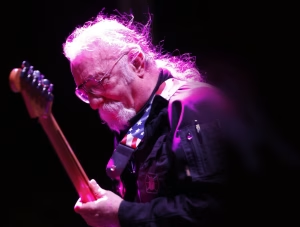 Would you like to share with us the story behind your solo in Donna Summer’s “Hot Stuff” (1979)?
Would you like to share with us the story behind your solo in Donna Summer’s “Hot Stuff” (1979)?
Sure. It’s interesting. I got a call but I didn’t know that I got a call, because my assistant didn’t tell me. But about a week after I got the call from Giorgio Moroder (ed: Donna Summer producer), my assistant said: “Oh, this guy Giorgio Moroder called, but I looked at your schedule and I told him you didn’t have any time”. I said: “Well, I should probably at least call him back”. So, I called him back and he said: “I would like you to play on what I’m doing with an artist named Donna Summer. I would like you to come in and work as a studio musician”. I said: “Ok. What kind of music is it?” and he said: “Well, it’s really disco” and I ‘ve been doing so many disco albums that I just said: “You know, why don’t you call Jay Graydon (ed: Barbra Streisand, Jackson Five, Dolly Parton) ?”. I guess he had called Jay and he said: “No, call Skunk”. So, he called back and I said: “Ok. I ‘m happy to do it, but I just wanna do what I wanna do. If that’s ok with you, we ‘ll try something in your session” and he said: “That’s why I ‘m calling you. I want you to do whatever you want”. So, I realized that all my guitars were in transit, I really didn’t have anything. I needed a guitar, so I went down to a guitar center where I used to go all the time and I knew the owner very well and I said: “I need a guitar now. I’m on my way to a session, I need some” and he was laughing and he said: “Well, there is that box in the middle of the floor that says: ‘Buy me $25’” and they were 5 or 6 guitars in it. So, I walked over and I picked up the Burns Bison and I said: “This is great”. I paid him 25 bucks, grabbed a six-pack of Budweiser and I went down to Rusk Studios again and we did “Hot Stuff” and then I came back to do “Bad Girls” with a guitar synthesizer and then the rest is history. So, yeah, a 25-dollar guitar. Anybody who says you need to have an expensive instrument to sound good, I would have to argue with that.
There is an amazing photo of you with Rory Gallagher backstage after a Doobie Brothers show in 1976 at The Spectrum, Philadelphia. Do you remember that meeting with Rory?
I do and I had met him a couple of times before that. I just thought the world of him. He was a really great musician and a really great person.
You said that the British Invasion bands did American musicians a huge favor. Could you explain this to us?
Yeah! I thought that American popular music was starting to be too cute. Jerry Lee Lewis – we were doing a show together- described it as “the Bobby era”. “Everything was Bobby: Bobby Vee, Bobby Rydell, Bobby, Bobby, Bobby and rock ‘n’ roll started to turn really bland”. So, back in the ‘60s when this all happening -I don’t think they did it on purpose- but the Brits went back to the American roots, The Stones, The Beatles, everybody, The Kinks, The Yardbirds and The Pretty Things, they went back to American roots and extracted the basics of that and suddenly there was a revival in BB King, J.B Hutto & the Hawks and Muddy Waters. They were taking those American music songs and transforming them and then when they became very popular in the United States it was like: “Hey guys, remember this. Remember your roots”. I think they did the American music scene a great favor, yes.
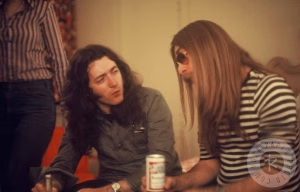
In the film “Blues Brothers 2000” (1998) you are a member of Louisiana Gator Boys along with BB King, Eric Clapton, Dr. John, Bo Diddley, Steve Winwood. Did you enjoy playing with all those people?
Yeah, absolutely. They are all friends and it was an opportunity for a bunch of guys to get together for five days and hang out and make a movie. It was fantastic.
You played with Spirit on “The Thirteenth Dream” (1984) album. Did you have fun playing with them?
I did. Randy California (guitar, vocals) was a very good friend. He was in Jimi’s band (ed: Jimmy James and the Blue Flames), back in the day, and we had been friends for years and years. I always thought he was a really fast-thinking guitar player; he didn’t have much fear, musically and he was also a wonderful person. As a matter of fact, I miss him and I already knew that inside he was a really good man and the fact that he died trying to save his 12-year old son from a wave, that he had to pull him out of the sea, up on the North Shore there in Hawaii and had died because of it. I mean, that says a lot about a person.
Was he disappointed because some people say that Jimmy Page took something from Spirit’s “Taurus” for “Stairway to Heaven”? Did he ever talk with you about this?
No and in a lot of ways, I think that situation was probably caused and initiated not as much by him, as much as the people around him. I mean, everybody borrows from everybody. Heck, the beginning of “Do It Again” (ed: from “Can’t Buy a Thrill” -1972) is right off of a Horace Silver record (ed: “Song for My Father” from the album of the same title -1964). This is blamed! So, everybody borrows from everybody. We never talked about it.
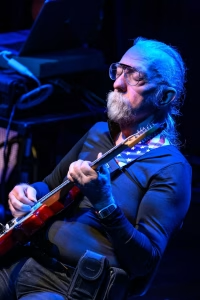 You were featured in the “Stars on Guitars” (2020) documentary about The Ventures. How important was their influence on you?
You were featured in the “Stars on Guitars” (2020) documentary about The Ventures. How important was their influence on you?
Extremely important. I grew up in Mexico City, so I listened to all of different kinds of guitar players and I was always a fan of The Ventures. I joined The Ventures fan club when I was 11 years old, I sent Bob Bogle (guitar) a letter, which he still had when I met him and it was a true honor for me to not only meet The Ventures, but to produce albums for them, to play in the band and to have them as good friends.
You jammed with Slash, Orianthi and Richie Sambora at the NAMM Tec Awards in 2015. Did you enjoy jamming with them?
Sure. Slash is a good friend and I ‘ve known Richie for a few years and Orianthi is a good player. It was fun. I felt like the old guy, sort of the grandfather in this guitar thing. So, I just waited for everybody to do what they wanted to and then I sort of tried to cap it off. I really enjoyed it.
Were you surprised when Slash asked you to give him pedal steel guitar lessons?
No, because I had been trying to get him to do it for years. I said: “You need to learn to play pedal steel. You, the way you think, you think like a steel player. The way that you approach the instrument, the logic that you use”. So, finally I convinced him and he ‘s been doing an awesome job. Pedal steel is not an easy instrument to learn to play. You really have to put in the time and I have to admit: Slash has put in a lot of time and effort and it shows.
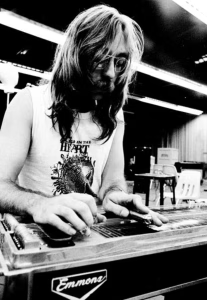 Keith Emerson told me that in the ‘60s and ‘70s the music was more important. It was a huge event when The Beatles had a new album out. You should listen to Paul McCartney’s bass, you should listen to John Lennon’s lyrics, you should listen to George Harrison’s guitar. Nowadays, nobody gives a shit about who the guitar soloist is on a Lady Gaga album”. Do you agree with this?
Keith Emerson told me that in the ‘60s and ‘70s the music was more important. It was a huge event when The Beatles had a new album out. You should listen to Paul McCartney’s bass, you should listen to John Lennon’s lyrics, you should listen to George Harrison’s guitar. Nowadays, nobody gives a shit about who the guitar soloist is on a Lady Gaga album”. Do you agree with this?
First of all, there is a song called “Video Killed the Radio Star” (ed: The Buggles -1979)… Let me step back, for most people music evokes images in mind. Each person has their own personal image based on the music that they are listening to. As soon as somebody said: “Here is what the music looks like” everything changed. Now, instead of using your own imagination, the image is being given to you. Then, on top of that, now with sunglasses, sneakers and jeans, music became a part of a stylistic package for people. “I am cool because I have these sunglasses, these sneakers and I have this on my iPod”. So, music became less of an experience than it became a kind of an accessory, in a lot of ways. Then, concerts and certainly The Doobie Brothers, we were guilty on putting on sometimes quite a show, but music then became an event as opposed to a concert. Yeah, I agree with Keith. It’s too bad. Back, when I was a kid, the first thing I would do, is read the liner notes of the album. I wanted to know who was doing what. Of course, I had a lot of respect. When I went to see Ella Fitzgerald and the Jazz All Stars in Mexico, my dad took me, who was playing saxophone? Charlie Parker. Who was playing guitar? Teddy Bunn. I mean, my God! Each one of these people was a tremendous musician in their own right. So, to me, understanding and knowing who was doing what, was really important. I think Keith had a good point. I feel we ‘ve lost something.
Had you ever met Stevie Ray Vaughan?
Yes. He was a really nice guy and I liked his style of guitar. He was a very aggressive guitar player, kind of the Link Wray world of digging in to the instrument. Almost playing at it, as opposed to on it. I liked his style a lot.
One of the best drummers you have worked with was Jeff Porcaro (Toto, Steely Dan). What was so special about him?
We must have done hundreds of recording sessions together, as studio musicians. It’s hard to explain that a drummer sees the feeling of a note in a different way. Even though, it’s written, 1-2-3-4 and quarter notes, how each drummer approaches, say, playing snare on the second beat and the fourth beat of the measure, defines their style. It’s just infinitesimally different and Jeff had the ability to stay a microsecond behind on the 2 and 4 and it gave the track a push and it changed the feel of the whole track. He was unique, in that respect. So, what can I say? That made him a very special drummer.
Did you like other guitarists from your era like Tommy Bolin (Deep Purple, Billy Cobham) ?
I did. There are so many guitar players. Adrian Belew, I love. He’s wonderful and a great person, as well. You know, it’s tough to think about all the guitar players that I like. I actually avoid listening to other players. Then, what you ‘ll have to say.
Who’s the musician you had the best interaction on stage?
For a while, I would say was CJ Vanston because we worked together on the solo project. With The Ventures, it was magic. I don’t know what it was. We just slid right into that. Barry Goudreau, the guitar player from Boston, we had a wonderful time playing together. Because we have very different styles we had to figure out a way to melt them together. “Mousey” Thompson who plays in our band, American Vinyl All Star Band, he was the drummer in James Brown’s band. We are locked, because I did play with James Brown for a while and we are locked together. We have more fun than I can stand. And John Entwistle! We had the vocals and mind melt whenever we played together.
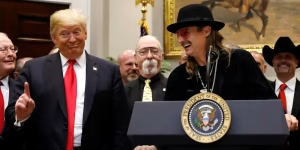
I read in Al Kooper’s book (“Backstage Passes and Backstabbing Bastards: Memoirs of a Rock ‘N’ Roll Survivor” -1998) that you were close friends and you made an album together (“Championship Wrestling” -1982). Did you enjoy that time?
Absolutely. I like Al, we are friends for quite a while. I haven’t seen him in a while but I think the world of him as a musician, an innovator, a great record producer and a player.
You were among the musicians who visited the White House in 2018. What was it like to meet Donald Trump?
I went there because he got involved with creating a legislation that would restore royalty payments to musicians who recorded music before 1972, especially a lot of black musicians who never got paid royalties for their performances that were used in rock ‘n’ roll compilations and stuff. So, I had a lot of respect for him for doing that, when a President would take time out of their life to help musicians. I ‘ve been to the White House many times, anyway, because I do a lot of work for the US government (ed: as a defense consultant).
A huge “THANK YOU” to Mr. Jeff “Skunk” Baxter for his time. I should also thank Mr. Mike Gormley for his valuable help.
Official Jeff “Skunk” Baxter website: https://www.jeffskunkbaxter.com/
Official Jeff “Skunk” Baxter Facebook page: https://www.facebook.com/skunkbaxter

